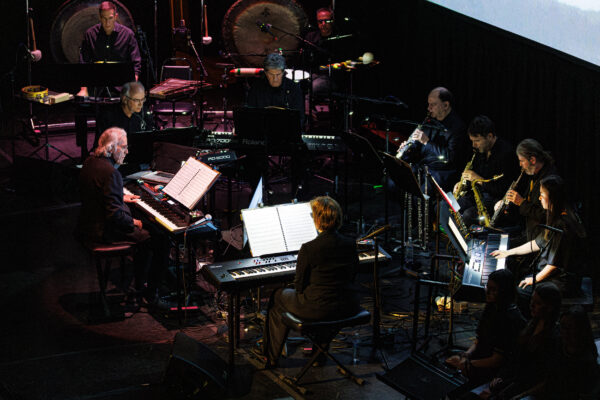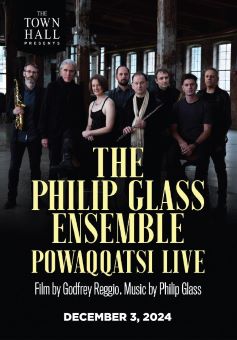A STUNNING COLLABORATION OF FILM AND MUSIC
I saw a special gem at the Town Hall last Monday, a viewing of Godfrey Reggio’s Powaqqatsi with its celebrated score – created by Philip Glass, who was in the house, and performed live by The Philip Glass Ensemble. The non-narrative film is the second of the Reggio/Glass “Qatsi” collaboration and it showcases the crises and problems in the Southern Hemisphere caused by the Northern Hemisphere. The director sent a short passionate video for us to see, before the screening began, where he quickly explained the genesis of the work, its meaning, and highlighted that the narrative of the film is within the music so we wouldn’t be lost looking for a plot because the film was often edited by Reggio and Glass to the form of the music.
The Philip Glass Ensemble and The Brooklyn Youth Chorus
The Brooklyn Youth Chorus
Powaqqatsi begins with an unforgettable montage of Brazilian men going up and down steep muddy hills, carrying heavy sacks of mud on their backs. They are working in a a gold mine in Serra Pelada and the task is not only backbreaking but futile because, despite their endless painful efforts, these workers are going to remain poor and desperate even as they enrich the already wealthy people living in the Northern Hemisphere. A reminder that it is the third-world labor that makes modern society possible, connecting with the meaning of the film title: Powaqqatsi (from two Hopi words) meaning “an entity, or a way of life, that consumes the life forces of other beings in order to further its own life.” In our world now ruled by oligarchs, it couldn’t be more on point.

Members of the Philip Glass Ensemble
Not happy to ruin the lives of millions of people – who we see living in semi-destroyed buildings, in shattered stilt-houses, washing in street puddles while cars go by – we also bring the environment down. Shot after shot of a gigantic cement skyscrapers complex in São Paulo that looks like an inhuman hive; dirty rivers; gray smokestacks from factories puffing out nasty air; endless garbage fields – most of the things you can imagine we have been doing to pollute our planet are in this film. But it is mixed with scenes of astonishing beauty, a kaleidoscope of extraordinary places from all different parts of the planet – Nepal, Kenya, Peru, France – with every possible color inside, a reminder of the beauty and harmony that are naturally on Earth. Reggio slows down and speeds up some scenes to add pathos, staying (sometimes too long) on the faces of people staring back at the camera and on children smiles.
Michael Riesman, conductor of the Philip Glass Ensemble
Members of the Philip Glass Ensemble
Conducted by Michael Riesman, the Ensemble was flawless; it doesn’t get better than that if you want to see any of the films in the Qatsi Trilogy. Philip Glass’s acoustic universe was palpable, the simplicity of his repetitions became anthemic and at times so touching and intimate as if the instruments were the voices of the people on screen. The use of percussions and African beats made it different from other Glass works, less minimalistic, more oriented toward world music. The Brooklyn Youth Chorus and Lisa Bielawa’s powerful voice added an almost sacred touch to the score.
The Philip Glass Ensemble and The Brooklyn Youth Chorus
Philip Glass attends Powaqqatsi at Town Hall
Powaqqatsi is a journey and it is as relevant today as it was in 1988 when it was released. In Spring, Town Hall will present the third film in the series, Naqoyqatsi; get tickets now because, if it’s anything like Powaqqatsi, it will be a memorable event.
photos by Sachyn Mital
The Philip Glass Ensemble: Powaqqatsi
presented by The Town Hall in NYC
reviewed on December 3, 2024

